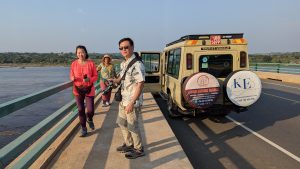
Essential Travel Advice for Exploring Uganda: A Comprehensive Guide
Essential Travel Advice for Exploring Uganda, Uganda, often referred to as the “Pearl of Africa,” is a country brimming with natural beauty, diverse wildlife, and vibrant culture. From the misty mountains of Bwindi Impenetrable National Park to the savannahs of Queen Elizabeth National Park, Uganda offers a wealth of experiences for travelers seeking adventure and discovery. However, like any destination, navigating Uganda requires careful planning and preparation. Here is essential travel advice to help you make the most of your journey through this enchanting East African country.
Visa and Entry Requirements:
Most travelers to Uganda require a visa for entry, which can be obtained in advance from Ugandan embassies or online through the Electronic Visa Application System (e-Visa).
Ensure your passport is valid for at least six months beyond your intended departure date from Uganda, and check visa requirements well in advance of your trip.
Health and Vaccinations:
Consult with a healthcare professional or travel clinic at least 4-6 weeks before your trip to receive recommended vaccinations such as yellow fever, hepatitis A and B, typhoid, and tetanus.
Malaria is prevalent in Uganda, so consider taking antimalarial medication and using mosquito repellent, long-sleeved clothing, and bed nets to prevent mosquito bites.
Safety and Security:
While Uganda is generally safe for tourists, exercise caution in crowded areas, avoid displaying valuables openly, and be vigilant against petty theft and pickpocketing.
Stay informed about local news and developments, particularly in border regions and areas prone to civil unrest or political tensions.
Transportation:
Domestic flights, buses, and minibuses (known as matatus) are common modes of transportation for traveling within Uganda. Ensure you book tickets in advance, especially during peak travel seasons.
Hiring a reputable tour operator or driver-guide is recommended for long-distance travel and safaris, as road conditions can vary, and navigation may be challenging in rural areas.
Accommodation:
Uganda offers a range of accommodation options, including luxury lodges, mid-range hotels, budget guesthouses, and campsites. Book accommodations in advance, especially during peak tourist seasons, to ensure availability.
Consider staying in eco-friendly lodges and community-owned accommodations to support sustainable tourism initiatives and local communities.
Wildlife Encounters:
When participating in wildlife activities such as gorilla trekking and chimpanzee tracking, adhere to park regulations, follow the guidance of trained guides and rangers, and maintain a respectful distance from the animals.
Gorilla trekking permits and chimpanzee tracking permits must be obtained in advance and are limited in number, so book early to secure your spot.
Cultural Etiquette:
Respect local customs, traditions, and cultural norms when interacting with Ugandans. Ask for permission before taking photographs of individuals, especially in rural areas and communities.
Learn a few basic phrases in the local languages, such as Luganda or Swahili, to facilitate communication and show appreciation for the local culture.
Responsible Travel:
Practice responsible tourism by minimizing your environmental impact, conserving water and energy, and supporting local businesses, artisans, and conservation initiatives.
Respect wildlife and natural habitats by avoiding littering, feeding animals, or engaging in activities that may disrupt their natural behavior.
By following these essential travel tips, you can embark on a memorable and enriching journey through Uganda, discovering its diverse landscapes, wildlife, and cultural heritage while ensuring a safe and responsible travel experience.
